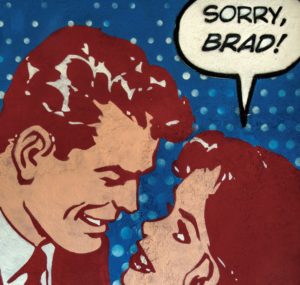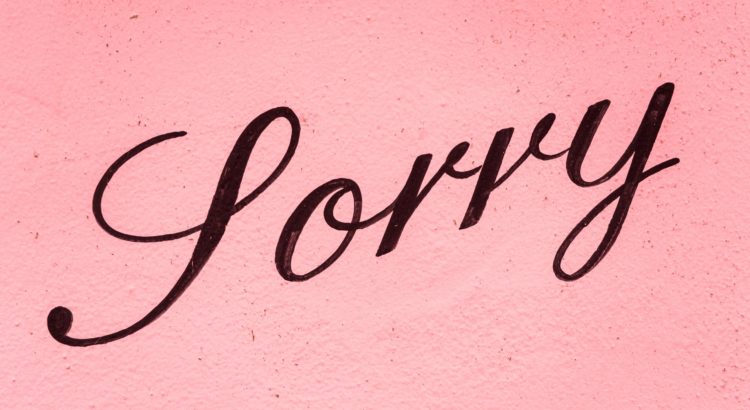Level B1 and above
A survey in 2016 found that that the average British person says ‘sorry’ about eight times per day. Not that the British have more to apologise for than others. Besides, ‘sorry’ is not just about good manners which require you to apologise when you have done something wrong. In fact, the British say ‘sorry’ even when they are not at fault.
Someone bumps into them in the street, they say ‘sorry’. You tell them the weather is bad in Switzerland, they say ‘sorry’. Your cat is sick – ‘sorry’. They want to ask you for some information – ‘sorry’. They would like to sit next to you – ‘sorry’.
Written and compiled by Benedicte Gravrand, The Language House
“Only the Japanese seem to have anything even approaching the English sorry reflex”
Saying ‘sorry’ is a reflex. According to social anthropologist Kate Fox, “Only the Japanese seem to have anything even approaching the English sorry reflex.
“Our excessive, often inappropriate and sometimes downright misleading use of this word devalues it, and it makes things very confusing and difficult for foreigners unaccustomed to our ways,” Fox told BBC.com. Still, she added, “I don’t think saying sorry all the time is such a bad thing.”

‘Sorry’ is not just for apologising
‘Sorry’ is not just about expressing remorse. It is also used to express sympathy, to acknowledge an unfortunate circumstance, or to show a non-confrontational stance, humility, to create trust, to get someone’s attention, and to require clarification.
For example:
I’m so sorry this happened to you.
I’m sorry to hear that.
I’m sorry for your loss.
I’m sorry for him.
I’m sorry about you losing your job.
I’m sorry for barging in on you like that… / for interrupting…
Sorry to bother you
Sorry, is anyone sitting here?
Sorry? (I did not understand what you said. Could you please repeat?)
Sorry can also be confrontational or threatening:
I’m sorry? What did you just say? When you are not happy about what someone said.
Don’t you dare do that again, or you’ll be sorry! As a threat.
You also use ‘sorry’ as an introduction when you are telling a person something they may not want to hear:
No, I’m sorry, I can’t agree with you.
I’m sorry, but Miss Lee is resting and can’t be disturbed.
Sorry–no baths after ten o’clock.
Sorry, wrong number.
As you can see ‘sorry’ is used all the time. It’s definitely not the hardest word.
Elton John – Sorry seems to be the hardest word – with lyrics
Using ‘sorry’ to apologise
Saying ‘sorry’ to apologise might be enough in some circumstances, but it does not count as sufficient in others. Best to add words around it, such as:
- I’m truly sorry for what I have done. It was wrong. I regret it now. I will never do it again. What can I do to make it right?
- Looks like I gave you the wrong phone number. Sorry about that.
Sorry about that: for minor mistakes
- “I lost the book you lent me. I’m so sorry!“
“I’m so/very/really/terribly sorry”: I understand I caused a problem
- “I’m sorry if I caused you pain / for causing you pain.”
- “I’m sorry (that) I behaved in such a childish way.”
All the words in bold can be found in the vocabulary quiz below.

Tracey Chapman – Baby, Can I hold you tonight
Other ways to apologise
My apologies (or ‘I apologise for’: more formal than ‘sorry’)
My apologies, but your order will not arrive until Monday.
In business English, we often use phrases like “We sincerely apologise” (apologize in
the U.S.) or “Please accept our apologies.”
Pardon / pardon me / I beg your pardon (formal)
- Pardon me; I didn’t mean to offend you.
- Pardon? I didn’t catch what you said.
Excuse me (when you interrupt a conversation or apologise for committing a social no-no)
- Excuse me; I didn’t realize that wearing shoes indoors was impolite in this country.
Mea Culpa (to apologize or take responsibility for wrongdoing)
- The witness wrote a statement of mea culpa after he was caught lying in court.
Oops / Whoops (used for mild errors or social blunders)
- Whoops, I am so sorry, I broke your coffee mug.
My bad (slang expression used to claim responsibility for an action). American English. See song by Khalid below.
- I lost the book you lent me. My bad! I will buy you a replacement.
My fault (admitting responsibility)
- It was my fault that we didn’t get to the airport on time.
Take full responsibility (more formal situations)
- I take full responsibility for failing to train the employees properly.
I messed up / I screwed up (informal ways to say you did something wrong)
- I can’t believe I forgot your birthday. I messed up.
I owe you an apology (often used to open or to begin the conversation)
- I owe you an apology. I said some horrible things to you.
I should have / I shouldn’t have (talk about what the correct action would have been)
- I shouldn’t have taken your camera. I should have asked you first.
That was wrong of me (or ‘it was wrong’: my action was not morally correct)
- I gave you the silent treatment, and that was wrong of me.
Ashamed of (I feel bad about it)
- I haven’t been helping you around the house at all. I’m ashamed of my behaviour.
I truly/really/sincerely regret (I feel bad about it)
- I truly regret my offensive comments.
How can I make it up to you? (what can I do to compensate for my mistake)
- I’m sorry I had to work late, and missed our date. How can I make it up to you?
I hope you can forgive me (or ‘will you forgive me?’)
- I know that what I did was wrong. I hope you can forgive me.
Khalid – My Bad
Expressions with the word ‘sorry’
- What he must not do is to sit around at home feeling sorry for himself. (keep thinking unhappily about his problems)
- The fire left Kuwait’s oil industry in a sorry state. (in a bad state)
- She is a sorry sight. (in a bad state / miserable)
- They were a sorry lot. (in a bad state / wretched)
- I’ll take my backpack; better safe than sorry. (it is better to be prudent)
- A sorry excuse for a man (disappointing)
- We’re going to have to lay off 100 employees, I’m sorry to say / report (talk about something bad or disappointing)
Sources: Grammarly.com; Expressoenglish; CollinsDictionary.com; MacMillanDictionary.com
Subscribe (abonnez-vous) to our blog:
leave your email address on the right hand column
and you will receive a confirmation email.
Quote Quiz
Match these quotes with their author:
- Never ruin an apology with an excuse.
- Life becomes easier when you learn to accept an apology you never got.
- An apology is a good way to have the last word.
- Apologies only account for that which they do not alter.
- Never apologise, mister, it’s a sign of weakness.
- Apologizing does not always mean you’re wrong and the other person is right. It just means you value your relationship more than your ego.
- An apology is the superglue of life! It can repair just about anything!
a. Mark Matthews – author (The Protector)
b. Unknown
c. Benjamin Franklin – founding father of the United States
d. Lynn Johnston – Canadian cartoonist (For Better or For Worse)
e. Robert Brault – author
f. Benjamin Disraeli – 19th century Prime Minister of the United Kingdom
g. John Wayne – American actor
Answer key:
1:c – 2:e – 3:b – 4:f – 5:g – 6:a – 7:d
Justin Bieber – Sorry
Vocabulary quiz
Here are 18 words found in the text above. Match them to their corresponding definition.
- Apologise
- Bump into
- Misleading
- Devalue
- Sympathy
- Remorse
- Acknowledge
- Stance
- Barge in
a. to treat someone or something as if they are not important
b. to accidentally hit against something (in this context)
c. to accept or admit that something exists, is true, or is real
d. a natural feeling of kindness and understanding that you have for someone who is experiencing something very unpleasant
e. to tell someone that you are sorry for doing something wrong or for causing a problem
f. to enter a room suddenly and noisily, usually interrupting someone in a rude way
g. intended or likely to make someone believe something that is incorrect or not true
h. a strong sad and guilty feeling about something that you have done wrong
i. an attitude or view about an issue that you state clearly
Answer key:
1:e – 2:b – 3:g – 4:a – 5:d – 6:h – 7:c – 8:i – 9:f
10. Bother
11. Confrontational
12. Count
13. No-no
14. Wrongdoing
15. Blunder
16. Slang
17. Offensive
18. Excuse
a. a careless or embarrassing mistake
b. something that most people do not approve of
c. to annoy someone by interrupting them when they are busy or want to be left alone
d. a reason that you give to explain why you have done something bad, or why you have not done something that you should have done
e. words or expressions that are very informal and are not considered suitable for more formal situations
f. behaving in a way that shows you want to have an argument or fight with someone
g. to think of someone or something as a particular thing, or to be thought of as a particular thing: Does geography count as a science subject?
h. behaviour that is illegal or not moral
i. unpleasant or insulting, and likely to make people upset or embarrassed
Answer key:
10:c – 11:f – 12:g – 13:b – 14:h – 15:a – 16:e – 17:i – 18:d
Paul McCartney – Uncle Albert – with lyrics


